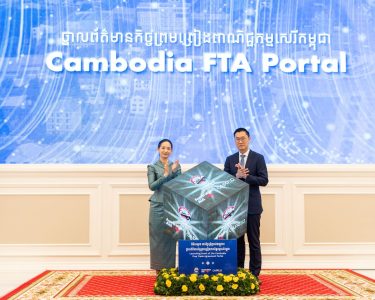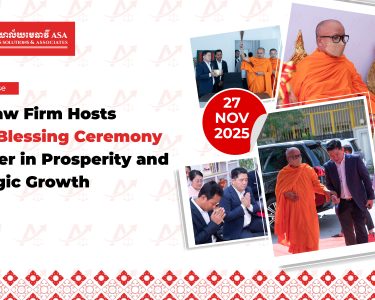Cambodia Investment Review
DFDL Cambodia has published its Investment Guide to Real Estate in Cambodia – 2025, offering one of the most comprehensive overviews to date of the Kingdom’s evolving legal, regulatory, and investment environment for local and international real estate stakeholders.
Released at a time of significant economic growth and legal modernization, the guide is positioned as a crucial resource for developers, investors, and legal professionals seeking to navigate Cambodia’s real estate landscape, which is undergoing continued transformation across ownership rights, licensing requirements, and tax compliance.
Cambodia’s Real Estate Market Sees Renewed Interest
The report outlines a robust outlook for the Cambodian real estate sector, supported by a projected 5.8% GDP growth in 2024 and ongoing government reforms to streamline regulation. While the construction sector experienced some recent slowdowns, high-end residential properties and industrial zones remain active, with demand buoyed by urbanization and foreign interest in special economic zones.
Read more: Explainer: DFDL Insights on Cambodia’s New Tax Implications for Trusts Under Prakas 192
The guide underscores the Kingdom’s appeal as an investment destination within ASEAN, particularly in co-owned buildings and industrial developments, sectors that continue to see favorable regulatory treatment for foreigners and regional firms.
New Legal Frameworks for Foreign Ownership and SEZs
A central focus of the guide is Cambodia’s evolving legal position on land ownership, especially for foreign investors. While foreigners are constitutionally restricted from directly owning land, the guide details four legal alternatives, including long-term leases, minority interests in Cambodian companies, trust structures under the 2019 Trust Law, and economic land concessions.
For residential property, foreigners may own up to 70% of co-owned buildings above ground level, provided the structures are registered as such. New regulations, including Prakas No. 050 (2024), have been introduced to simplify the registration process for co-owned units constructed before 1997.
The guide also provides detailed analysis of Cambodia’s Special Economic Zones (SEZs), with 26 zones currently operational and attracting over $10 billion in capital investment across nearly 800 projects, creating more than 180,000 jobs.
Stricter Licensing and Compliance Under Real Estate Laws
A major update in the guide is the implementation of Sub-Decree No. 50 (2023) and Prakas No. 047 (2023), which overhaul the licensing framework for real estate developers. Developers are now required to obtain licenses for housing, co-owned buildings, or land-lot projects based on project scale. Licensing procedures are administered by the Real Estate Business and Pawnshop Regulator (RPR) under the Non-Bank Financial Services Authority (FSA), replacing the Ministry of Economy and Finance’s prior role.
Key compliance measures include:
- Minimum capital requirements based on project type.
- Business security guarantees ranging from 2% to 5% of development costs.
- Mandatory opening of a developer’s account for all transactions.
- Penalties for non-compliance, including fines of up to KHR 500 million (~$125,000).
To date, the RPR has granted 573 licenses for residential and co-owned developments and accredited 283 real estate service providers.
Emphasis on Environmental and Zoning Regulations
The guide also highlights recent regulatory shifts including Cambodia’s Environmental and Natural Resources Code (2023), set to come into full effect in mid-2024. This legislation brings sweeping changes across land use, sustainable city development, energy, waste management, and environmental impact assessments (EIA), consolidating and replacing multiple earlier laws.
In parallel, zoning compliance continues to gain traction through Sub-Decree No. 42 on Urbanization. Land use plans are now in effect for major cities and provinces, with Phnom Penh, Siem Reap, Preah Sihanouk, and others implementing stricter oversight on building height, parking, and development density.
Developers are encouraged to engage early with local and national authorities — including entities like the Apsara Authority in Siem Reap — to ensure alignment with permitted land use and avoid costly delays or project suspensions.
Digital Platforms for Land Registration and Licensing
In support of Cambodia’s broader digital transformation goals, the Ministry of Land Management, Urban Planning and Construction (MLMUPC) has launched an online cadastral service and trialed digital platforms for land transfers, strata title conveyance, and leasing agreements. These initiatives aim to improve transparency and reduce bureaucratic inefficiencies, although full implementation and integration across provinces remain ongoing.
The RPR has also initiated a digital application portal for professional certificates and licenses via the “CamDigik” app, streamlining submissions and reducing the need for physical documentation.
Taxation and Financial Instruments
The guide includes a breakdown of all taxes applicable to property ownership, including the 4% transfer tax, tax on unused land, and capital gains tax. It also discusses real estate investment trusts (REITs), financing structures, and the role of hypothecs as preferred legal instruments for securing land-based loans.
The DFDL Cambodia Investment Guide to Real Estate 2025 delivers a thorough and practical overview of the current real estate investment climate, legal landscape, and compliance requirements. As Cambodia continues to modernize and regulate its property market, the guide serves as a vital tool for informed decision-making, particularly for foreign and institutional investors aiming to enter or expand within the market.
📖 To download the full guide for free, click here: https://www.dfdl.com/insights/content-hub/publications/investment-guides/investment-guide-to-real-estate-in-cambodia-2025/





